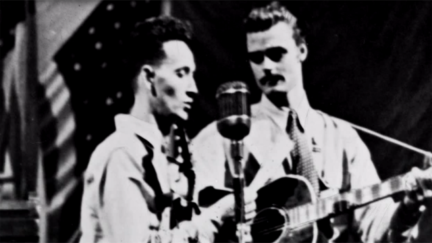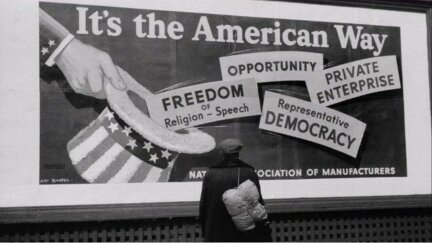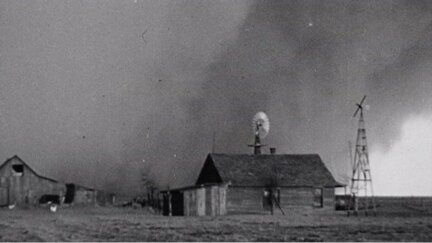Woody Guthrie


Journalist, Musician (1912-1967)
Woodrow Wilson “Woody” Guthrie is arguably the most influential American folk musician of the first half of the 20th century. He is best known for his folk ballads, traditional and children’s songs, and improvised works, often incorporating political commentary. Woody Guthrie is closely identified with the Dust Bowl and Great Depression of the 1930s. His songs from that time period earned him the nickname “Dust Bowl Troubadour.”
Born in 1912 in Okema, Oklahoma, Guthrie moved at age 18 to Pampa, Texas, a small town in the hardest-hit area of the Dust Bowl. It was in Pampa that he experienced the fury of Black Sunday — a severe dust storm that swept across the Midwestern states on April 14, 1935, and inspired Guthrie to write the song, So Long, It’s Been Good to Know You. After Black Sunday, Guthrie joined the ranks of Okies migrating to California in search of work. Many of his works — Do Re Mi, I Ain’t Got No Home, Talking Dust Bowl, and others — chronicle the difficult conditions faced by the working class Okies in their new home. At the close of the 1930s, Guthrie left California for New York City. It was there that he wrote his best-known song, This Land Is Your Land. In the often-omitted fourth and sixth verses of the song, Guthrie rails against class inequality.
As I went walking, I saw a sign there,
And on the sign there, it said “Private Property.”
But on the other side, it didn't say nothing!
That side was made for you and me.
In the squares of the city, in the shadow of a steeple,
By the relief office, I'd seen my people.
As they stood there hungry, I stood there asking,
Is this land made for you and me?
Guthrie died from complications of Huntington’s disease in 1967. Despite his decline, he had a major impact on American popular music in the second half of the 20th century and the rise of the folk movement, influencing such artists as Joan Baez, Johnny Cash, Bruce Springsteen, the Byrds, and Bob Dylan (for whom Guthrie was a mentor). Many of Guthrie’s recordings have been archived in the Library of Congress.
Related Video



